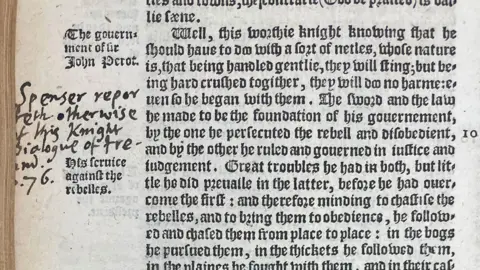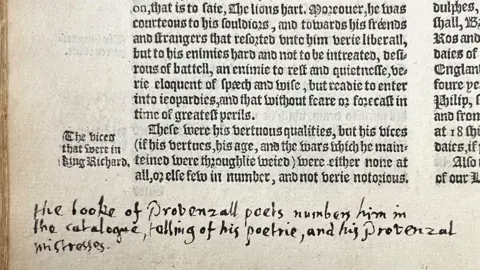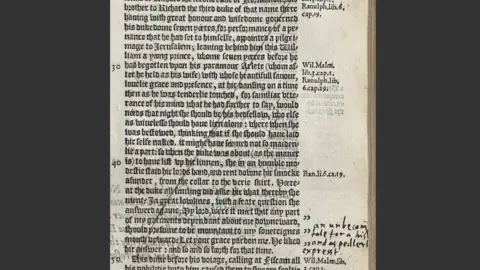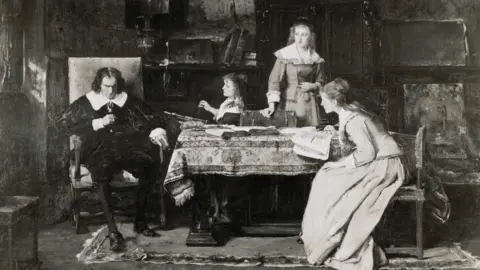Margin notes by poet Milton found in library book
 Cambridge University/Phoenix Public Library/PA Wire
Cambridge University/Phoenix Public Library/PA WireHandwritten notes by Paradise Lost poet John Milton have been identified in a copy of a book in an American library.
A curator from the University of Texas noticed annotations in the margins of the book - Raphael Holinshed's Chronicles (1587) - appeared to be in Milton's handwriting.
Photos of the annotations were sent to Prof Jason Scott-Warren at the University of Cambridge, who compared them with Milton's handwriting in two surviving manuscripts.
The Chronicles were a source of inspiration for the 17th Century poet, who studied at Christ's College, Cambridge and was known as a poet of radical politics.
 Cambridge University/Phoenix Public Library/PA Wire
Cambridge University/Phoenix Public Library/PA WireThe book was discovered in the Burton Barr Central Library in Phoenix by the Arizona Book History Group, which arranged for visiting researchers to study some of the books in its Alfred Knight collection.
The University of Cambridge said it was one of just three known books to preserve Milton's handwritten reading notes, and one of just nine books to have survived from his library.
'Prudishness'
Prof Scott-Warren, from the university's English faculty, said that Milton's decision to cross out a lewd anecdote in the book showed he was "not immune to prudishness".
The anecdote was about the mother of William the Conqueror, Arlete, who refused to let the then monarch, Robert I of Normandy, lift up her smock after he spotted her dancing.
In the margin, Milton dismisses this anecdote as inappropriate and told in the style of a pedlar hawking wares on the streets.
In Milton's words, it was "an unbecom[ing] / tale for a hist[ory] / and as pedlerl[y] / expresst".
Prof Scott-Warren said: "The adverb 'pedlerly' was quite rare in writing at the time and Milton was "stretching language to express his contempt".
"Milton is renowned as an enemy of press censorship, but here we see he was not immune to prudishness," Prof Scott-Warren added.
Milton crossed through the passage with a single, light diagonal line so the words beneath remain fully legible.
 Cambridge University/Phoenix Public Library/PA Wire
Cambridge University/Phoenix Public Library/PA WireWho was John Milton?
- John Milton (1608-1674) was a poet and civil servant living during one of the most volatile periods of English history
- Paradise Lost, his epic work published in 1667, was the inspiration for Philip Pullman's His Dark Materials trilogy
- Milton was nicknamed the Lady of Christ's in reference to his long hair while he studied at Cambridge
- He lived in Chalfont St Giles, Buckinghamshire, in his later life, escaping the Great Plague. Milton's Cottage remains his only surviving home.
Source: BBC Archive
 Getty Images
Getty ImagesVisiting researcher Dr Aaron Pratt, curator of early books & manuscripts at the University of Texas, noticed in March that the letter "e" in the handwritten notes resembled Milton's hand, leading to the discovery.
It is not known what happened to Milton's books after his death in 1674, but it is widely accepted that they were sold off in batches.
This latest discovery, barely five years after Shakespeare First Folio with Milton's handwritten notes was found in another US public library in Philadelphia, suggests that more of Milton's books may exist.
Prof Scott-Warren is co-author of the analysis, published in the Times Literary Supplement (TLS).
Follow Cambridgeshire news on Facebook, Instagram and X. Got a story? Email [email protected] or WhatsApp us on 0800 169 1830
